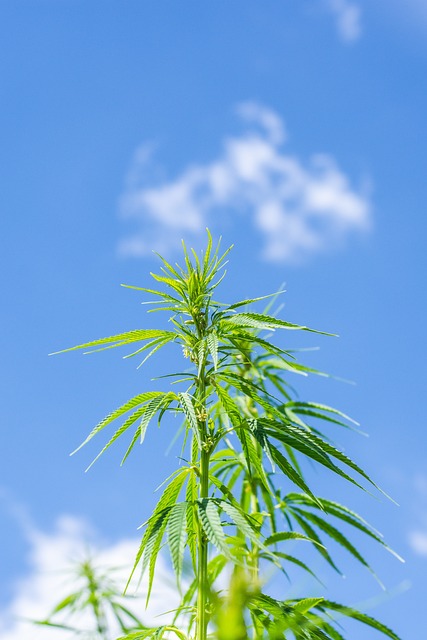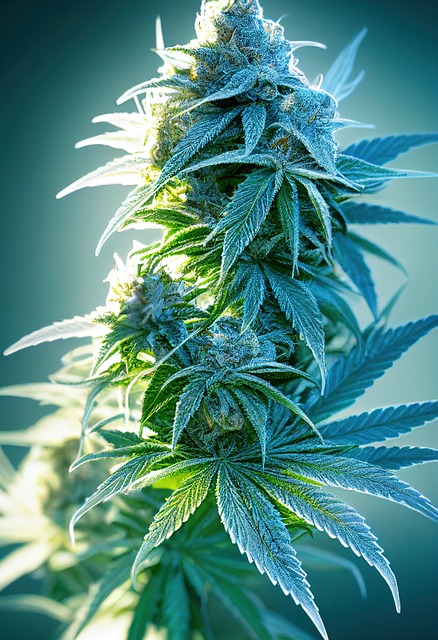THCA flower stands out for its anti-nausea properties, largely due to its non-psychoactive cannabinoid THCA's interaction with the endocannabinoid system. This interaction, particularly affecting CB1 receptors in the gastrointestinal tract, has shown promise in mitigating nausea symptoms, especially relevant for those undergoing chemotherapy. The presence of CBD in THCA flower further complements its anti-nausea effects, providing a natural and effective option for managing such symptoms without the psychoactive effects associated with THC. Preliminary studies suggest that THCA's anti-inflammatory and neuroprotective properties may extend its therapeutic benefits beyond anti-nausea care, potentially aiding in conditions like arthritis, multiple sclerosis, and various neurological disorders. The anti-nausea compounds found in THCA flower are currently under closer scrutiny through ongoing research, which aims to expand the scope of its therapeutic applications. As such, THCA flower is emerging as a multifaceted wellness tool with significant potential for holistic health practices.
Discover the transformative potential of THCA (Tetrahydrocannabinolic Acid) flower, a naturally occurring compound within the cannabis plant that offers potent anti-nausea benefits. This article delves into the therapeutic properties of THCA flower, elucidating its anti-nausea effects and how it can be seamlessly integrated into your wellness routine for effective nausea management. Beyond its antiemetic qualities, we explore the multifaceted advantages that THCA flower presents, making it a noteworthy addition to your health regimen. Join us as we unravel the science behind these benefits and consider the broader implications of this plant-based solution for wellness.
- Unveiling the Therapeutic Potency of THCA Flower for Anti-Nausea Relief
- The Science Behind THCA Flower's Anti-Nausea Properties
- Integrating THCA Flower into Your Wellness Routine for Nausea Management
- Exploring the Full Spectrum Benefits of THCA Flower Beyond Antiemetic Effects
Unveiling the Therapeutic Potency of THCA Flower for Anti-Nausea Relief

THCA flower, or tetrahydrocannabinolic acid flower, is a non-psychoactive form of cannabis that has garnered attention for its therapeutic properties, particularly in the realm of anti-nausea relief. Studies have indicated that THCA interacts with the body’s endocannabinoid system, which plays a pivotal role in regulating various physiological processes, including nausea and vomiting. The anti-emetic effects of THCA are attributed to its ability to stimulate the CB1 receptors in the brain, responsible for controlling appetite and nausea. This interaction can help alleviate the symptoms associated with conditions that cause nausea, such as chemotherapy-induced nausea and vomiting in cancer patients.
Furthermore, THCA flower’s anti-nausea compounds are not limited to direct interaction with the endocannabinoid system. It also possesses other phytochemicals that contribute to its therapeutic effects. Cannabidiol (CBD), which is often found in significant amounts in THCA flower, has been separately studied for its potential to reduce nausea and improve overall gastrointestinal function. The synergistic effect of these compounds within the THCA flower may enhance its anti-nausea benefits, offering a holistic approach to managing nausea without the psychoactive effects associated with other cannabinoids like THC. As research continues to evolve, the potential for THCA flower as an effective and natural anti-nausea remedy becomes increasingly promising.
The Science Behind THCA Flower's Anti-Nausea Properties

Research indicates that THCA, or tetrahydrocannabinolic acid, found in raw cannabis plants, including THCA flower, possesses a range of potential health benefits. Among these is its anti-nausea effect, which has been attributed to the interaction of THCA with the body’s endocannabinoid system. This system plays a crucial role in regulating various physiological processes, including nausea and vomiting. Studies suggest that THCA flower’s anti-nausea compounds act on the CB1 receptors found throughout the gastrointestinal tract. By modulating these receptors, THCA may help alleviate symptoms associated with nausea, particularly in individuals undergoing treatments like chemotherapy. The anti-emetic effects of THCA are believed to stem from its ability to influence the serotonin system, which is closely linked to nausea and vomiting. Preclinical research has demonstrated that THCA can reduce nausea and vomiting in animal models, offering a promising basis for further investigation into its therapeutic potential in humans, especially in conditions where nausea is a significant concern.
Integrating THCA Flower into Your Wellness Routine for Nausea Management

Incorporating THCA flower, which contains a range of cannabinoids including tetrahydrocannabinolic acid (THCA), into your wellness routine may offer beneficial anti-nausea effects. THCA is known for its potential to alleviate symptoms associated with nausea and has been studied for its efficacy in managing such conditions. The anti-nausea compounds found in THCA flower interact with the body’s endocannabinoid system, which plays a significant role in regulating various physiological processes, including those that influence nausea. Users who engage in this wellness practice often report a decrease in feelings of queasiness and an improvement in their overall sense of well-being. It is important to note the appropriate dosage and method of consumption for THCA flower, as individual responses may vary and professional guidance is recommended to ensure safe integration into your health regimen.
For those seeking natural alternatives to manage nausea, the anti-nausea properties of THCA flower present an intriguing option. The therapeutic potential of this compound is being explored for a variety of conditions, including chemotherapy-induced nausea, where conventional treatments may not be sufficient or desired by the patient. As with any wellness practice, it is essential to consult with a healthcare provider before starting THCA flower as part of your nausea management strategy, especially if you have underlying health conditions or are taking other medications. By understanding how THCA flower can complement conventional therapies and by utilizing it responsibly, individuals may find a valuable addition to their personalized anti-nausea wellness routine.
Exploring the Full Spectrum Benefits of THCA Flower Beyond Antiemetic Effects

THCA flower, which contains Tetrahydrocannabinolic Acid A (THCAA), a non-psychoactive precursor to the well-known psychoactive compound THC, has garnered attention for its broad spectrum of potential health benefits. Beyond its well-documented anti-nausea effects, THCA flower is being explored for a multitude of therapeutic properties. Research suggests that THCA interacts with the body’s endocannabinoid system, which plays a pivotal role in maintaining balance and regulating various functions, including pain sensation, mood, and memory. This interaction may contribute to the compound’s anti-inflammatory effects, making it potentially beneficial for conditions like arthritis or multiple sclerosis. Moreover, THCA is being studied for its neuroprotective qualities, which could have implications for neurological disorders. Its anti-nausea compounds are not the sole benefit; they form part of a wider array of properties that include analgesic and antioxidant effects, further expanding the potential use cases for THCA flower in holistic health practices. As research continues to evolve, the full spectrum of benefits associated with THCA flower becomes increasingly apparent, offering promising avenues for both acute and chronic conditions.
THCA flower emerges as a promising natural remedy for those seeking anti-nausea relief, grounded in scientific evidence of its therapeutic properties. Its integration into a wellness routine presents a compelling alternative for nausea management, with benefits that extend beyond mere symptom alleviation. The full spectrum of compounds found within THCA flower not only contribute to its anti-nausea effects but also offer a host of additional health advantages, positioning it as a versatile and valuable addition to one’s holistic health strategy. As research continues to unveil the potential of this natural compound, it is clear that the THCA flower holds significant promise for enhancing overall well-being.
